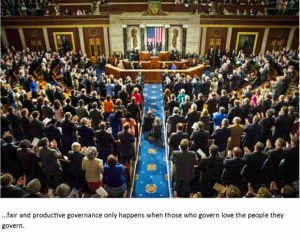Members of Congress, Do you love us?
19 April 2017
 Many years ago, I asked my father what he viewed as the best form of government. His response was “a benevolent dictatorship.” I understood he was saying citizens would be best served by a dictator who had absolute authority, but loved the people he or she governed. My thinking was that the American system was working and I did not need to give further attention to Daddy’s response. As I look at what is happening today in America by way of the actions and attitudes of politicians, especially those in Congress, I have tremendous appreciation for what Daddy said all those years ago. He understood that fair and productive governance only happens when those who govern love the people they govern.
Many years ago, I asked my father what he viewed as the best form of government. His response was “a benevolent dictatorship.” I understood he was saying citizens would be best served by a dictator who had absolute authority, but loved the people he or she governed. My thinking was that the American system was working and I did not need to give further attention to Daddy’s response. As I look at what is happening today in America by way of the actions and attitudes of politicians, especially those in Congress, I have tremendous appreciation for what Daddy said all those years ago. He understood that fair and productive governance only happens when those who govern love the people they govern.
This reflection on my part leads me to ask, “Members of Congress, do you love us?” That is, do these politicians, who primarily hold the future of this nation in their hands, love the citizens they represent and govern? Four experiences over the period March 19-26, 2017, caused me to ask this question.
On Sunday, 19 March, Carol Day died. For several months, she had visited the Sunday school class that I am in at First Baptist Church (Anderson Street in Fayetteville). Anybody reading what I write, correctly, concludes that I am conservative in my thinking and beliefs. Suffice it to say, Carol was not in the same camp. Consequently, we had some serious discussions in class from two different perspectives. In every one of those exchanges, she was calm and measured in her comments, while I exhibited my usual passionate tone. As I have spent a lot time thinking about those exchanges between Carol and me, I believe if we had needed to come to consensus on some issue to directly help people, we would have done so. We would have done so because of our shared love for people. That love for people would have mandated our reaching consensus.
Then came my four and a half hour drive to Asheville, North Carolina, on 23 March for two days of facilitation training. All the way up, I listened to reports regarding Republican efforts to pass legislation in the House of Representatives that would repeal and replace Obamacare (mixed in was information on Senate action relative to confirmation of Judge Neal Gorsuch as an associate justice of the U.S. Supreme Court). There was a parade of Republicans and Democrats to microphones. Some Republicans strongly supported the health care legislation, while others of the party vowed their opposition. Democrats did absolutely nothing other than repeatedly oppose repeal and replacement of Obamacare, which is, without doubt, failing.
Among Republicans, opposition came from multiple groups and several individual members of Congress. I hold that chief among the opposing groups was the Freedom Caucus. This caucus is made up of over 35 members of the House who are committed to conservative values. Rep. Mark Meadows (R-NC) chairs this group. Meadows and members of the caucus seemed to be endlessly, before cameras, voicing their opposition and seeming to bask in having the votes to defeat the proposed legislation. Even senators, such as Rand Paul (R-Kentucky), seemed to live in front of a camera while attacking the proposed legislation. In the end, the legislation was not presented for a vote because President Trump and Republican House leadership realized it would not pass.
The Democratic Congressional approach to addressing health care is consistent with their response to working with President Trump and the Republican majority in Congress on any matter presented by the president. To this point, that approach is to oppose whatever is put forth and to do so without making a rational argument. In addition to the proposed Obamacare repeal and replace legislation, this lack of rational argument was profoundly demonstrated in Democratic opposition to confirmation of Judge Neal Gorsuch to serve on the Supreme Court. It is clear that much of the Democratic opposition to Judge Gorsuch is rooted in Republican refusal to act on President Obama’s nomination of Judge Merrick Garland for the same seat. That nomination was made on 16 March 2016, ten months before the end of President Obama’s term. Republican Chuck Grassley represents Iowa in the United States Senate where he serves as chairman of the Judiciary Committee. As an example, lack of rational argument by Democrats shows in the following quotes from an opinion piece by Senator Grassley titled, “The truth about Schumer, Democrats and Gorsuch”:
To many of us, it appeared to be a simple case of amnesia. They obviously had simply forgotten that both Senator Reid and Senator Schumer had declared that George W. Bush would get no Supreme Court nominees through the Democratic Senate more than 18 months before the end of his term. Or, even in 1992 when then-Senator Biden made clear his intentions in a long, detailed speech on the Senate floor outlining the reasons why the Senate wouldn’t consider a Supreme Court nominee of George H.W. Bush in his final year.
Anybody watching the nomination hearing for Judge Gorsuch before the Senate Judiciary Committee witnessed a brilliant presentation showcasing his command of the law, his record of independence, his strong sense of humility, and his focus on following the Constitution instead of prejudging cases or promising results.
(In the end, Judge Gorsuch was approved, but only after Republicans changed the rules in order to overcome Democratic opposition.)
The next experience was over the two days of facilitation training in Asheville. The course was “ToP Facilitation Methods” (ToP is Technology of Participation). What I would call the course tagline is: “The people of planet earth need ways to create their future together.” Two quotes from the course workbook:
“In Summary: ToP is not a technique for deciding something in a meeting. Nor is ToP a process that leaves people irritated and exhausted by the struggle to reach agreement.”
“Top is both an empowering culture in which decisions get made, and a process that leaves people enlivened and motivated for action.”
Over 16 hours together, eight strangers learned the ToP process and practiced the techniques. We became a united group and walked away with a valuable tool for leading people to consensus and commitment to action.
The final experience was on Sunday, 26 March. Stephanie Bohannon, Assistant Pastor at First Baptist Church, preached a sermon titled, “The Questions Jesus Asks: ‘Do You Love Me?’” She spoke from that passage in John 21: 15-17 where Jesus, three times, asks Peter, “…do you love Me?” Every time, Peter answered “yes” and, every time, Jesus commanded him to take some action. Bohannon explained that Peter was answering the wrong question. He thought Jesus was talking about Philia which is a companionable love. That definition is from www.mcleanbible.org. She said Jesus, instead, was referring to agape. The Mclean link says, “Agape desires only the good of the one loved. It is a consuming passion for the well-being of others.” Jesus was calling Peter to go “above and beyond,” to take great risks on behalf of people.
All of this brought me to realize Daddy was, in his statement about a benevolent dictatorship, saying that those who govern must have agape love for the governed. Remembering those exchanges with Carol Day reinforces that there is hope for consensus, even among those who disagree when they share agape love for people who will be helped by the achievement of consensus. The facilitation training showed me how it looks when people seek consensus with a clear aim and because of love for those affected by the outcome. Stephanie Bohannon reminded me that this all-important agape love shows itself through actions, not meaningless words. Against the backdrop of these experiences, seeing how Congress handled the health care legislation and Gorsuch nomination prompted my “Do you love us?” question.
This thinking through leads me to conclude that there are some members of Congress who love us, but most don’t. Consequently, the American people need to be about determining who loves us and sending the rest home. Yes, it is definitely time to “Drain the Swamp.”





Leave a Reply